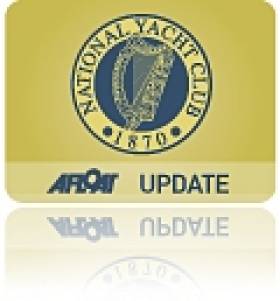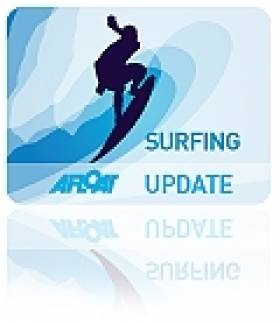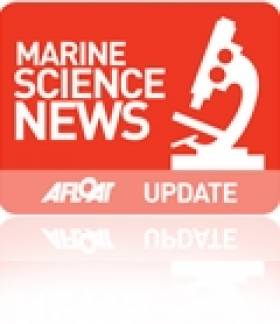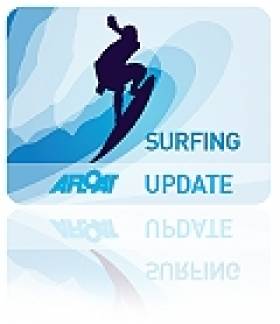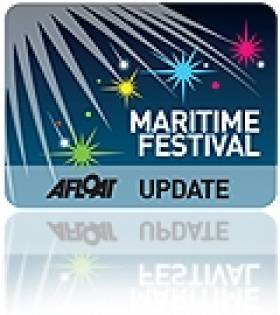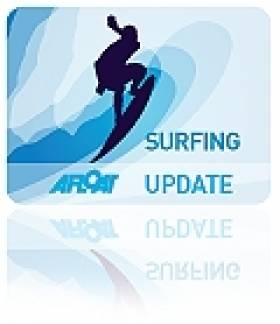Displaying items by tag: music
'Skylark' Brings A Touch Of Jazz To the NYC
#NYC - Here's something a little different from the National Yacht Club in Dun Laoghaire: an evening of jazz in the company of Carmel McCreagh and her band on Thursday 17 October.
Described as having a "mellow and velvety" voice, McCreagh will be performing standards from the Great American Songbook such as 'The Days of Wine and Roses' and 'Come Rain or Come Shine', just two of the songs by Jimmy Mercer she recorded for her new album Skylark.
Tickets are just €10 per person available from the yacht club. For more see the NYC website here.
#Surfing - Two national broadcasters will base themselves in Bundoran this week ahead of the Sea Sessions Surf Music Festival at the weekend.
Today FM’s KC Show will broadcast live from the Bundoran RNLI Lifeboat Station tomorrow 19 June and Thursday 20 June, while 2FM will broadcast from the Sea Sessions from Friday 21 to Sunday 23 June, giving the seaside town unprecedented national media coverage for five days.
As part of a recent Discover Ireland promotion on Today FM, listeners were asked where to send the various shows to on their holidays. Listeners to the KC Show had a choice of sending him to Dingle or Donegal and following thousands of votes, Donegal came out on top.
One of the locations suggested was Bundoran, and the RNLI Lifeboat station at the pier was chosen as the home for the KC Show for two daily broadcasts this week complete with live musical guests Walking With Cars and new Irish act Daithi.
No sooner will Today FM have packed up than the 2FM Roadcaster will be rolling into the Main Beach car park and preparing to broadcast from the Sea Sessions on Friday, Saturday and Sunday.
The national state broadcaster will give the festival unprecedented coverage with over 20 hours scheduled live from the beachfront. Jenny Greene, Cormac Battle, Ruth Scott and Paddy McKenna will all host their shows live across the weekend.
Bundoran tourism officer Shane Smyth commented: "I am thrilled that not one but two national broadcasters will be in town this week. It will be a welcome boost to the ongoing promotion of Bundoran as a destination.
"Speaking as Bundoran RNLI volunteer lifeboat press officer also, I’m obviously delighted that the RNLI will benefit from two days of national coverage and I know that KC and his team are keen to find out more about the lifeboat service here in Bundoran."
Smyth added: "The guys from 2FM had a great time when they were here a few weeks ago and we look forward to welcoming them again over Sea Sessions weekend. Last time they were here they brought scorching sunshine with them – let’s hope they do the same again!”
Sea Sessions is Ireland's "biggest and best" surfing and music festival and returns for its sixth successive year in 2013. Based in Bundoran, the festival also includes surf tour events in Lahinch, Co Clare and nearby Sligo.
'Longest River' Hailed A Success In Brussels
#MarineScience - A unique audio-visual performance intended to communicate the importance of marine science and research has been praised at a showcase event in Brussels.
The Marine Institute has collaborated with Galway-based choir Cois Cladaigh on The Longest River, in which a selection of Latin and English choral music and traditional Irish pieces from the 9th century onwards are put to a photo slideshow depicting marine scenes and species, and video footage of extreme environment under the deep ocean.
According to the Marine Institute: "The unique collaboration has created an innovative means of engaging new audiences and raising the awareness of the science of our oceans and the importance of the deep seas that support our life on earth."
As previously reported on Afloat.ie, EU Fisheries Commissioner Maria Damanaki - a co-patron of the initiative - said The Longest River "demonstrates the importance of international collaborations on ocean research".
The marine science literacy and communication event, described as "an arts, music and science fusion", was presented to an audience of over 200 people as part of the celebration of Ireland’s Presidency of the Council of European Union at Eglise du Saint – Sacrement in Brussels.
The Longest River was also presented to over 100 primary school pupils at the Ecole Europeenne de Brussels IV in the Belgian capital. The children were introduced to Irish musicians Eugene Lambe and Kathleen Loughnane who spoke about the history of their instruments and played the Uillean pipe and Irish harp.
Dr Brendan O’Connor, director of Cois Cladaigh, also taught the pupils how to perform the Rondes by Folke Rabe, a contemporary performance extending the expression of vocal sounds that cannot be found in any language, yet are possible sounds inspired from deep within the ocean.
Supporting the Marine Institute and the development of The Longest River, Dr O’Connor said: “This event has enabled Cois Cladaigh to raise its profile amongst a wider audience as well as contribute to the ethos of evoking innovative arts and science literacy, offering better communication to a broad societal audience."
Undertones Top Music Lineup at Eurosurf 2011
Derry punk legends The Undertones will headline a hit music lineup to entertain the crowds at Eurosurf 2011 in Bundoran later this month.
The band best known for 'Teenage Kicks' top a weekend-long bill that includes popular traditional fusion group Kila, who will kick off the Eurosurf party on the Friday in what's often considered the 'surfing capital of Ireland'.
Dubliners Royseven will also play after the gala screening of Soul Surfer on Saturday 24 September.
The full lineup is available at discoverbundoran.com.
Eurosurf press officer Shane Smyth said: "We are thrilled with the calibre of musical acts which have been confirmed to play in Bundoran during Eurosurf.
"The Undertones, Royseven and Kíla are sure to offer visitors and spectators an exciting and complementary plan which will ensure that between surfing and entertainment, a great time and experience will be had by all."
The European Surfing Championships take place in Bundoran from 24 September to 2 October.
An Evening of Maritime Music at the NCH
On 21 May the Culwick Choral Society will present a very maritime-inspired evening of music at the National Concert Hall.
The highlight of the show will be a performance of 'A Sea Symphony' by Ralph Vaughan Williams, with vocals provided by soprano Cara O'Sullivan, baritone Paul Carey Jones and the New Dublin Voices chamber choir.
The programme - supported by RTÉ Lyric FM – will also include Mendelssohn's 'Hebrides Overture' and Beethoven's 'Calm Sea and Prosperous Voyage'.
Tickets start at €15 and are available from the National Concert Hall box office at 01 417 0000 or online at www.nch.ie.
Clare Will Be Rocking for Surf & Music Festival
Thousands of visitors are expected in the west Clare town of Miltown Malbay for the Cold Pro surf and music festival on the June bank holiday weekend.
The Irish Examiner reports that Imelda May, Peter Hook (New Order) and Jamie xx are among the acts signed up for the two-day event, which will feature live music across three stages - as well as an invitational surfing tournament with €20,000 in prize money up for grabs.
The Irish Examiner has more on the story HERE.



























